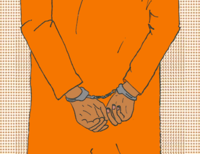S.2846 will make phone calls free of cost for incarcerated people and their families in Massachusetts.
by Jenny Landon,
September 4, 2020
The Prison Policy Initiative joined a coalition of over 100 organizations, legal service providers, public defenders, social workers, and directly impacted people to sign on to a letter urging the Massachusetts State Legislature to pass S.2846, a bill that would make phone calls free of cost for incarcerated people and their families.
The burden of expensive phone calls overwhelmingly falls on family members, especially on women: in Massachusetts, families pay $24 million per year to stay connected to their incarcerated loved ones, and a national study found that the cost will put one in three families into debt. Black and brown people in Massachusetts are disproportionately criminalized and targeted by police, so expensive phone calls to correctional institutions disproportionately strip money out of the pocketbooks of families of color.
Before the pandemic hit, more than 50 percent of families with an incarcerated loved one struggled to pay for basic housing and food needs. With the economic hardship brought on by COVID-19, it is now urgent that Massachusetts stops subsidizing our exploitative and expensive carceral system with regressive costs that fall on the most impoverished in the state.
In Massachusetts, there are thousands of people held in jails pre-trial because they cannot afford bail, and their phone calls are the most expensive of all incarcerated people in the state. When people can’t get together the funds to get out of jail, exorbitant phone rates only make a difficult time even harder. Not only do people held pre-trial need to coordinate childcare or elder care, make arrangements for missing work, have prescriptions brought to the facility, or simply have someone to talk to while incarcerated, they also have to organize their defense.
People detained pretrial are more likely to plead guilty just to get out of jail, more likely to be convicted, and more likely to get longer sentences. Costly phone calls play a central role in this injustice by limiting how often and how long pretrial detainees can talk to their families and friends in the service of their defense. As a result, pretrial detainees often present a weaker defense than they would have if they had been able to make calls freely. On a systemic level, high phone rates from jails hurt indigent defendants by draining already-scarce resources from public defenders’ offices.
As written in the full letter:
As a result of the work of Black organizers, constituents across the Commonwealth understand that no-cost calls are about keeping families together. People should not be forced to pay for a lifeline, nor the programs offered by the DOC and county facilities. It is unconscionable that in this moment a mother is forced to choose between buying groceries and talking to her incarcerated child or that a child would need to forego hearing his incarcerated mother’s voice when they most need comfort. The Commonwealth must intervene to ensure that corporations can no longer profit from lines of communication that are critical to creating the support networks necessary for success upon reentry. We respectfully ask you to pass S. 2846 this session!
For these reasons and many more, we urge the Massachusetts State Legislature to pass S.2846. Are you in Massachusetts and want to support this bill? Call your representatives and senators!






